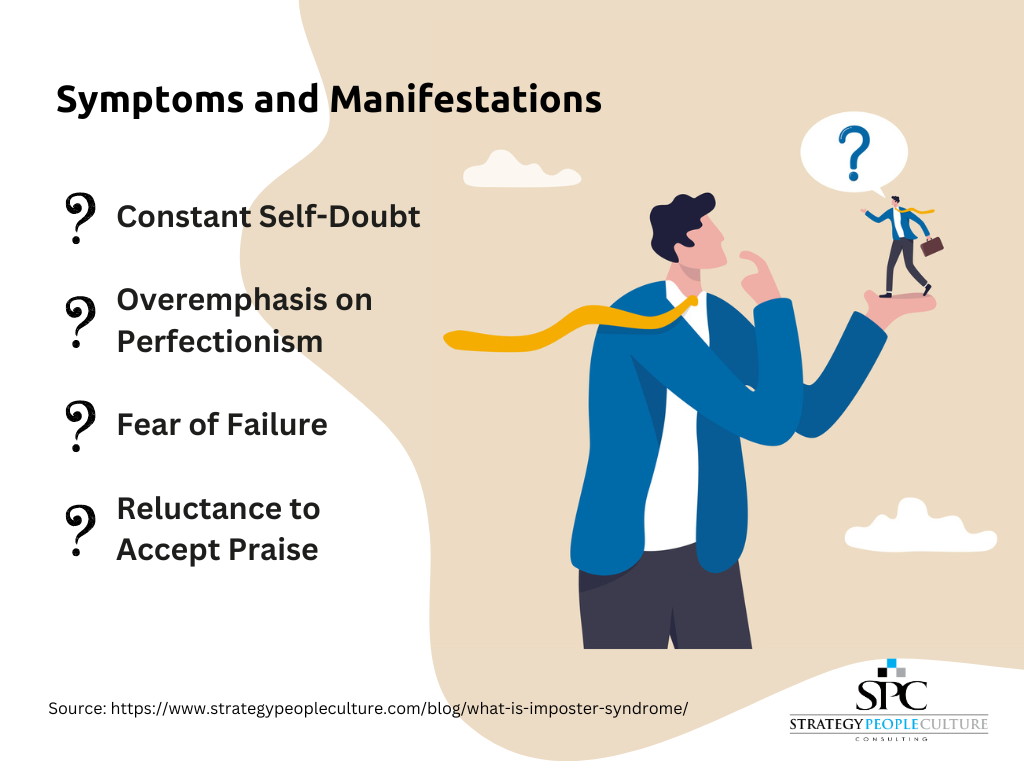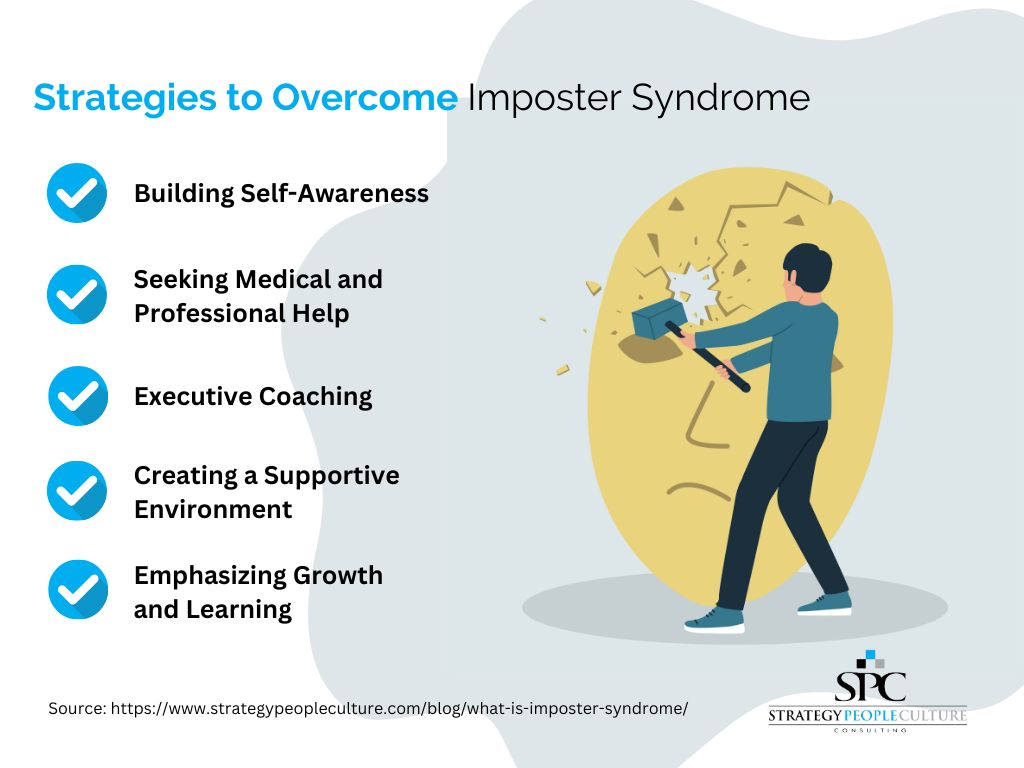Why Even Top Executives Experience Imposter Syndrome?

Did you know that some of the most accomplished and successful executives feel like frauds? Despite their evident success, they can’t shake off the feeling that they don’t deserve it and that they will soon be found out.
This phenomenon is surprisingly common among executives. A recent survey conducted by Moneypenny highlights that imposter syndrome affects a significant portion of Americans, with 1 in 3 individuals experiencing it. Among those aged 18-24, the prevalence is even higher, with 46% reporting feelings of self-doubt. These findings shed light on the widespread impact of imposter syndrome and emphasize the need for support and awareness in addressing this issue.
The focus of this blog is to delve deeper into why this happens. Let’s explore the underlying causes, how it manifests, and most importantly, how it can be effectively addressed.
What is Imposter Syndrome?

Imposter Syndrome, a psychological pattern, often manifests in high-achieving individuals, making them doubt their accomplishments and harboring an internalized fear of being exposed as a ‘fraud’. The condition was first identified in 1978 by Georgia State University psychology professor Pauline Clance and psychologist Suzanne Imes in a study of high-achieving women.
It’s a crippling feeling that can hold back even top-level executives from reaching their goals. Despite their successes and recognition, people with imposter syndrome often feel inadequate and undeserving of their success.
A recent study by KPMG LLP found that an estimated 75% of women executives in the US feel held back by Imposter Syndrome, which is significantly higher than men. Despite the common perception that women are more prone to imposter syndrome, men are just as likely to experience these feelings of fraudulence.

Why Executives are Prone to Imposter Syndrome
The high expectations and pressure that come with top-tier positions can be a double-edged sword. On the one hand, they drive us to excel; on the other, they make us question our accomplishments, wondering if we truly deserve our success or if it’s merely a result of luck.
When assuming a leadership position, executives often experience a palpable sense of isolation. While being at the helm and responsible for steering the ship, an undeniable feeling of loneliness accompanies being at the top. This seclusion can intensify the imposter syndrome, amplifying self-doubt and insecurity.
Then there’s the paradox of success. With every achievement, instead of feeling pride, we often feel a growing fear of being exposed as frauds. It’s as if success only amplifies the voice in our head telling us we’re not good enough. And for women and minorities, who often have to work twice as hard to prove themselves, imposter syndrome can be particularly potent.
Symptoms and Manifestations

In essence, imposter syndrome is a shared secret among executives. It’s a silent struggle hidden behind the facades of power and success. But by acknowledging and discussing it, we can begin to overcome it, turning self-doubt into self-confidence.
Let’s identify four key manifestations of imposter syndrome:
- Constant Self-Doubt: Despite a track record of success, those with imposter syndrome often question their abilities. They may feel like they’ve gotten where they are through luck rather than merit. It might be a sign of imposter syndrome if you’re constantly second-guessing yourself.
- Overemphasis on Perfectionism: Setting high standards is not inherently negative, but those with imposter syndrome often set unrealistically high goals and berate themselves for not meeting them. If you find yourself caught in a cycle of relentless self-criticism and exhaustion, perfectionism could be masking your imposter syndrome.
- Fear of Failure: Fear can be a powerful motivator, but it can also be paralyzing. Those with imposter syndrome constantly fear falling short or making a mistake. If fear is holding you back from taking risks and reaching your potential, it’s worth considering whether imposter syndrome is at play.
- Reluctance to Accept Praise: Success should be celebrated, but those with imposter syndrome often deflect praise and credit their achievements to external factors. It could be a symptom of imposter syndrome if you struggle to accept compliments or recognition.
These symptoms are not exhaustive, and it’s possible to experience some without having imposter syndrome. However, if these signs resonate with you, it might be time to confront your self-doubt.
Remember, acknowledging the problem is the first step toward self-improvement and growth. Consider seeking support from an executive coach who can provide valuable insights and tools to help you navigate these feelings of self-doubt and impostorism.
Impact on the Individual and Organization

Imposter Syndrome’s impact is far-reaching, influencing not just the individual but also team dynamics and organizational culture, ultimately affecting overall performance. Here are the three key areas that are most affected:
Personal Stress and Burnout
Persistent self-doubt, a hallmark of Imposter Syndrome, can lead to high levels of stress and burnout. The relentless cycle of self-criticism and fear of exposure can be mentally exhausting, impacting one’s health, work-life balance, and overall job satisfaction. If you find yourself constantly questioning your achievements, it might be a sign that you’re grappling with Imposter Syndrome.
Team Dynamics
Leaders struggling with Imposter Syndrome may inadvertently create a high-pressure environment, mirroring their own internal turmoil. This can foster a culture of fear and insecurity, disrupting team cohesion and collaboration and consequently impacting productivity. If your team seems to be under constant pressure, it might be worth considering whether Imposter Syndrome is at play.
Organizational Culture and Performance
Left unchecked, Imposter Syndrome can breed a toxic culture where employees are afraid to take risks, stunting innovation and growth. It can significantly impact an organization’s performance as employees constantly second-guess their decisions, leading to inefficiencies and missed opportunities. If your organization seems stuck in a rut, it might be time to address the elephant in the room – Imposter Syndrome.

Case Studies and Some Real-Life Examples
To illustrate the pervasive nature of Imposter Syndrome, let’s consider the following real-life examples and findings from psychological research.
Female Executives and Minorities:
- Sheryl Sandberg: As the COO of Facebook, Sheryl Sandberg is one of the most powerful women in the business world. Yet, she openly admitted in her book “Lean In” that she grapples with Imposter Syndrome. Despite her astounding accomplishments, she often felt out of place and undeserving of her success.
- Maya Angelou: Despite having over 50 honorary degrees and a Pulitzer nomination, the critically acclaimed author and poet often expressed feeling like a fraud. She once said, “I have written eleven books, but each time I think, ‘uh oh, they’re going to find out now. I’ve run a game on everybody, and they’re going to find me out.'”
Male Executives:
- Howard Schultz: The former CEO of Starbucks, in an interview with the New York Times, disclosed that he continually grappled with a sense of self-doubt and impostorism throughout his career. Despite leading Starbucks to global prominence, Schultz often questioned his own merit.
- Albert Einstein: Despite being one of the most revered scientists in history, Einstein also experienced Imposter Syndrome. He described himself as an “involuntary swindler” whose work didn’t deserve the attention it received.
These examples and research insights demonstrate that Imposter Syndrome is a widespread experience affecting people across industries, roles, and backgrounds. It underscores the need for strategies and interventions to address this pervasive psychological phenomenon.
Strategies to Overcome Imposter Syndrome

A. Building Self-Awareness
Understanding personal triggers and patterns that lead to imposter feelings is a critical starting point in combating imposter syndrome. These triggers could be specific situations, interactions, or even certain types of feedback that intensify feelings of self-doubt and inadequacy. They could also be linked to specific patterns of behavior, such as procrastination or over-preparation, which serve as coping mechanisms to mask feelings of fraudulence.
Developing this self-awareness allows you to anticipate and prepare for situations likely to trigger imposter feelings, enabling you to respond more self-assuredly and constructively.
B. Seeking Medical and Professional Help
Imposter Syndrome is deeply rooted in one’s psyche and sometimes requires professional intervention to address. Seeking help from a therapist or counselor can play a crucial role in overcoming Imposter Syndrome. These professionals can provide a safe and supportive environment to share your thoughts and feelings, helping you challenge and reframe any negative self-beliefs. They can also equip you with an arsenal of practical strategies and cognitive-behavioral techniques to combat self-doubt, boost self-esteem, and foster a more positive and realistic self-perception.
C. Executive Coaching
Executive coaching plays a pivotal role in cultivating empathy, self-regulation, and interpersonal effectiveness. Through targeted exercises and feedback, an executive coach can help build stronger relationships, manage emotions in a healthy way, and navigate social complexities with grace.
Through executive coaching, business leaders can:
- Identify self-sabotaging behaviors, reframe adverse thought patterns, and empower the individual to embrace their work with greater confidence.
- Identify their strengths and areas for improvement, enabling them to lead with authenticity and confidence.
- Articulate thoughts and ideas more effectively, greatly enhancing your ability to connect with others and express ideas.
D. Creating a Supportive Environment
Collaboration among leaders and other executives encourages individuals to work together, share ideas, and learn from each other. It sends the message that everyone’s input is valuable, which can alleviate feelings of inadequacy. Encouraging open and honest feedback can help individuals gain perspective on their work and understand their strengths and areas for growth.
E. Emphasizing Growth and Learning
To overcome imposter syndrome, shifting focus from perfection towards continuous improvement is crucial. This means acknowledging that mistakes and setbacks are part of the learning process rather than evidence of incompetence. Emphasize the value of growth and learning by setting realistic, attainable goals and celebrating the small wins along the way rather than focusing solely on the end result.
Conclusion
Imposter Syndrome doesn’t have to be a permanent state of mind. With the right tools and support, executives can confront their self-doubt and take control of their success. Ultimately, overcoming Imposter Syndrome allows us to be more authentic, confident leaders, enabling us to reach our highest potential.
Embrace your accomplishments, have faith in your abilities, and always remember that you deserve success as much as anyone else.
If you’re an executive grappling with these feelings, know that you’re not alone. Strategy People Culture offers specialized consultations to help leaders like you navigate and overcome imposter syndrome. Don’t let self-doubt hold you back. Reach out to Strategy People Culture today and schedule your consultation.
